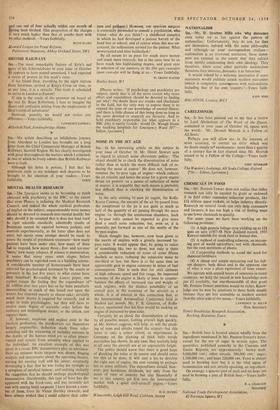MENTAL HEALTH RESEARCH
SIR,—The Spectator seems to be becoming as much obsessed with psychiatry as the BBC, to the extent that even Pharos is indicting the Medical Research Council, and indeed the whole medical profession, of negl:ct on the subject; unquestionably more money should be devoted to research into mental health; but why should it be assumed that it does not lend itself to HO scientific standards; admittedly results of treatment cannot be equated between patients and controls experimentally, as the latter class does not exist, but surely some attempt should be made to assess the results of psychiatric treatment—how many patients have been under care, how many of these to respond, how many three-, five- and ten-year 'cures,' hew many relapses. If science is mensuration, it seems that many years must elapse before psychiatry can be regarded even as a budding science. A considerable number of homosexuals have been referred for psychological treatment by the courts or privately in the last five years; to what extent have they benefited? Re-reading the Lancet paper, one cannot escape the feeling that the expenditure of FA mill ion over two years has so far been peculiarly unrewarding; so much of this bread cast upon the waters has returned merely as cheese-cake; certainly much more money is required for research, and in order to train psychologists, but they will have to evolve some degree of scientific order before the ordinary not unintelligent doctor, or the citizen, can support them.
If, however, suspicion and neglect exist in the medical profession, the psychiatrists arc themselves largely responsible; deduction made from echo- sounding and the measuring of turbidity currents in the depths of the human mind are so often unwar- ranted and remote from actuality when applied to the individual. An excellent example of this was given in a recent BBC documentary play on television. Here an eminent brain surgeon was shown, flinging scalpels and instruments about the operating theatre, cursing his nursing staff and his junior, eventually developing a fear that he was losing his eyesight as a symptom of cerebral tumour, and resisting violently the suggestion that he should undergo psychological examination. (Incidentally, this type of boor has dis- appeared with the frock-coat, and was certainly not met with among brain surgeons. I have known a num- ber of these, from Sir Victor Horsley onwards, and have always wished that I could achieve their calm- ness and patiegice) However, our spurious surgeon is eventually persuaded to consult a psychiatrist, who found—what do you think?—a childhood complex in which he had developed a jealous hatred of the head boy at school; and of course when this was un- covered, the millennium arrived for the patient. What unwarranted and utter balderdash!
By all means let us press for much more money and much more research; but at the same time let us have much less highfaluting dogma, and great care in selection of our mentors, or the jibe quis custodiet ipsos custodes will be flung at us.—Yours faithfully, Harley Street, WI W. GRANT WAUGH
[Pharos writes : 'If psychology and psychiatry are suspect, surely that is all the more reason why more effort and expenditure should be devoted to finding out why? No doubt there are cranks apd charlatans in the field, but the only way to expose them is to expand the store of our knowledge of mental illness; and there is little chance of this being done so long as the sums devoted to research are derisory. And to hold psychiatry responsible for what appears in a BBC play is surely foolish: would Dr. Waugh blame the teaching hospitals. for Emergency Ward 10?'— Editor, Spectator.]


































 Previous page
Previous page